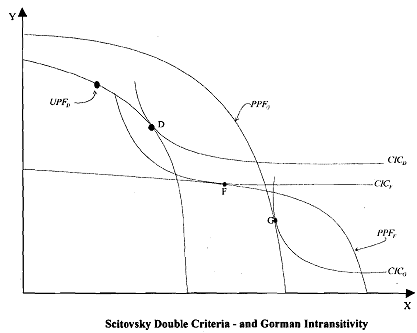William Gorman's Intransitivity Problem:
William Gorman demonstrated that while the Scitovsky double criteria rules out Scitovsky reversals, it does not rule out intransitive chains. For instance, it may be that an allocation G is preferred to allocation D, allocation D is preferred to allocation F but allocation F is not preferred to allocation G. This is shown in Figure, where there are three PPFs (PPFD, PPFF and PPFG) and three CICs corresponding to the Pareto-optimal allocations on each PPF (allocation D on CICD, allpation F on PPFF and allocation G on PPFG). It can be seen that unlike in Figure, D is superior to F by the Scitovsky double criteria because it is better than F by both the Kaldor and Hicks criteria and moreover, CICD does not intersect PPFF while CICF intersects PPFD.

The problem of intransitivity can now be visualized in Figure. As noted, by the double criteria, D is preferred to F. By the same double criteria, it can be argued that G is preferred to D, as CICD intersects PPFG but CICG does not. However, G and D do not fulfill the double criteria, as CICF intersects PPFG and CICG intersects PPFF, a situation similar to the one described in Figure. Thus, by the Scitovsky double criteria, G is preferred to D, D is preferred to F but G is not preferred to F. Consequently, although the Scitovsky double criteria rules out ranking reversals and although G is not preferred to F, F is also not preferred to G and they are merely incomparable, which implies that the ranking is intransitive.